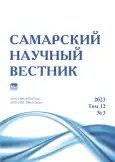The Battle of Waterloo in the Duke of Wellington’s dispatch to the Earl of Bathurst: «confession» of an accidental winner
- Authors: Egorov A.A.1
-
Affiliations:
- Southern Federal University
- Issue: Vol 12, No 3 (2023)
- Pages: 170-174
- Section: Historical Sciences
- URL: https://bakhtiniada.ru/2309-4370/article/view/253166
- DOI: https://doi.org/10.55355/snv2023123205
- ID: 253166
Cite item
Full Text
Abstract
The article is devoted to the analysis of an important historical document – the Duke of Wellington’s dispatch to the State Secretary for War and Colonies of the United Kingdom Earl of Bathurst, June 19, 1815 (in English tradition it is usually called The Waterloo Dispatch) in which the Iron Duke presented his account of the Battle of Waterloo (June 18, 1815) which ended the long series of so-called Revolutionary and Napoleonic wars, which lasted almost a quarter of a century. The author cites the opinions of Russian and foreign historians, who to one degree or another, tried to assess the Waterloo Dispatch, paying special attention to the characterization of this document by modern British researcher Andrew Roberts, given in his monograph «Napoleon and Wellington». Edith Saunders, who wrote a separate monograph on «Napoleon’s Hundred Days», categorically characterized the dispatch of the Iron Duke calling it «a joyful account of the battle». However based on the above mentioned assessments and based on his own analysis of the dispatch of June 19, the author came to the conclusion that the Waterloo Dispatch was an attempt to give an English interpretation of the events of the famous battle – a kind of «British Myth» and chronologically was predecessor to the «Napoleonic Myth» created by the defeated Emperor on the Island St. Helena about the fateful 19th century for Europe, battle.
Keywords
Full Text
##article.viewOnOriginalSite##About the authors
Alexander A. Egorov
Southern Federal University
Author for correspondence.
Email: egorov_1799@mail.ru
doctor of historical sciences, professor of Foreign History and International Relations Department
Russian Federation, Rostov-on-DonReferences
- Форрест А. За кромкой поля боя. Жизнь военных во времена Революционных и Наполеоновских войн. М.: РоссПЭн, 2022. 280 с.
- Граф Лас-Каз Мемориал Святой Елены. Т. 2. М.: Захаров, 2010. 584 с.
- Мартино Ж. Повседневная жизнь на острове Святой Елены при Наполеоне. М.: Молодая гвардия, 2008. 320 с.
- Hazareesingh S. The legend of Napoleon. London: Granta Books, 2005. 352 p.
- Gourgaud, General, Baron. Talks of Napoleon at St. Helena. Chicago: A.C. McClurg and C, 1903. 292 p.
- Куриев М.М. Железный герцог. М.: У Никитских ворот, 2021. 408 с.
- Куриев М.М. Ватерлоо. Битва ошибок. М.: У Никитских ворот, 2018. 239 с.
- Корнуэлл Б. Ватерлоо. История битвы, определившей судьбу Европы. М.: КоЛибри, 2022. 352 с.
- Corrigan G. Wellington. A Military life. London: Hambledon, 2001. 396 p.
- Holmes R. Wellington. The Iron Duke. London: Harper Collins Publishers, 2003. 324 p.
- Hibbert C. Wellington. A Personal History. London: Da Capo Press, 1997. 460 p.
- Hibbert C. Waterloo. London: Wordsworth Editions, 1998. 280 p.
- Roberts A. Napoleon and Wellington. London: Phoenix, 2002. 410 p.
- The Duke of Wellington. Military Dispatches. London: Penguin Books, 2014. 405 p.
- Левицкий Н.А. Полководческое искусство Наполеона. М.: Воениздат, 1938. 279 с.
Supplementary files






